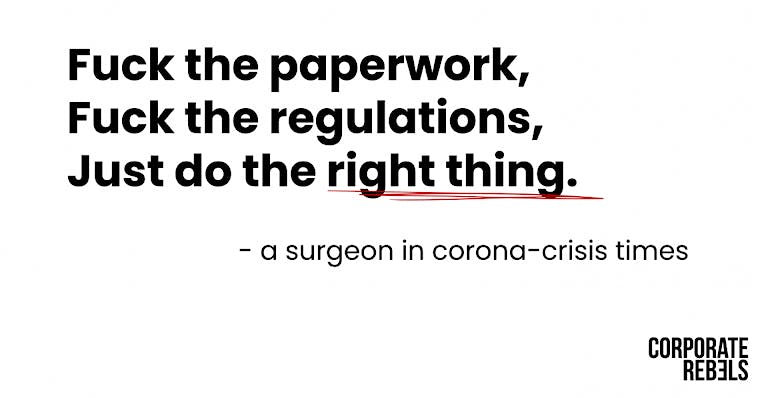COVID Crisis: F*ck The Paperwork, Just Do The Right Thing

For decades, people in essential and undervalued jobs (doctors, nurses, care workers, teachers, garbage collectors, janitors, delivery people, grocery store workers, etc.) have been bugged by increasing paperwork and pedantic managers prescribing how front-line people should do their work. The COVID crisis shows how flawed this logic is. Front-line workers should not be treated as kids, but as responsible and professional experts, with freedom to do their work as they think best. Will the COVID crisis fix what is broken?

Pim has writen: the COVID crisis reveals the true nature of our organizations. Some show inspirational solidarity; others just plain shitty, egocentric behaviour.
Fortunately, it also shows how they can be most effective in the chaotic environment they suddenly find themselves in.
Fuck the paperwork, fuck the regulations
Health care organizations are especially interesting to observe. Last week Tim Urban tweeted thoughts from a surgeon friend working in the epicentre of the COVID crisis. Read his revealing thoughts below.

Just do the right thing
This surgeon points perfectly at what is wrong with many modern workplaces. Administrators and higher-ups in artificial hierarchies invent paperwork, rules, protocols, and other useless bureaucratic exercises—just to command and control. The results? Discouraged experts and essential workers not allowed to do what they were trained to do.
Now, when the shit hits the fan some, like the surgeon above, can finally be professionals, use their judgement, take care of patients/clients, and solve problems. Finally, they just can do the right thing!
Leadership lessons
The surgeon concludes with a lesson in leadership. He says, "The captain of the ship helps navigate it on a journey the scope and length of which is too long for the sailors to contemplate. But in times of crisis, a leader should be a calm voice of honest, candid information, and work to support the local experts who know how to keep the ship from capsizing. Don't tell the engine room how to do their job. Let them tell you, and then give them the tools."
The COVID crisis proves it once again. An independent, well informed and empowered workforce that trust the mandate it receives from its leaders is much more effective in handling a crisis than a top-down controlled group that doesn't trust the information it receives from the top—just as highly democratic countries handle crises better than dictatorial regimes.
Buurtzorg, a progressive example
The leadership at Buurtzorg, the Dutch health-care organization, shows the corona-crisis requires distributed local customization and not centralized orders from the top or bureaucratic government institutions. They employ 10,000+ home-care nurses of whom >99% work in self-managing teams, at the front-line. There are no managers in this organization, just 20 coaches, 50 staff at headquarters, and two directors.
Jos de Blok, one of the directors recently said: "A command structure does not relate to self-organization based on solidarity. It is much more effective if everyone finds its own way, instead of waiting for the centralized government to deliver. Everyone gets frustrated within such centralized management. It simply doesn’t work. You do not take people seriously."
He also said: "The ownership of solutions should be placed with the nurses who are dealing with the problems locally. Local nurses do not benefit from a top-down command structure in which one person who is far from the front-line sends orders into the organization."
To help local teams to make the right decisions in times of the current crisis, Buurtzorg has started a 24/7 crisis team that coordinates everything within Buurtzorg. This team is made up of specialized nurses, an epidemiologist, and the two directors. The crisis team says: "We receive advice from nurses all over the country. We receive the best solutions from the front-line. The self-managing teams are used to solve matters themselves. We, as a crisis team, just mobilize the collective wisdom of all nurses."
The crisis-team constantly monitors and learns how solutions work out in practice. They meet every day for an hour in a 'crisis-meeting' to discuss all proposed advice, suggestions and solutions, and to formulate unified advice for the 1,000+ local self-managing teams. Jos de Blok: "We communicate advice that teams can actually use. The point is that teams feel supported, and that they can actually work with the proposed solutions."
This shows how to stick to your progressive principles, even in times of crisis.
Will we fix what is broken?
The question remains if others will learn from this crisis. How will we treat front-line workers in post-corona workplaces? Will we finally fix what is broken? Will we finally release our most valuable (but paradoxically most undervalued) workers from the shackles of bureaucracy and hierarchy?
Will we finally learn to throw the useless paperwork away? To throw unnecessary regulations, protocols and rules out of the window? Will we finally learn not to tell the engine room how to do their job? To let them tell us what they need and then give it to them?
Will we finally learn to provide essential workers with freedom and trust so they can use their judgement to just do the right thing?
It is about time!




